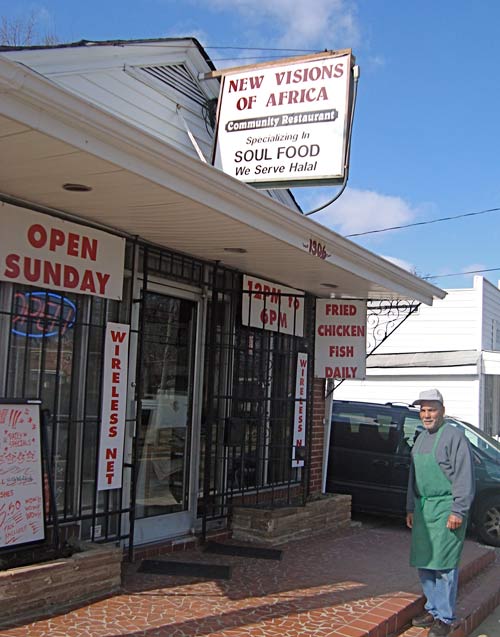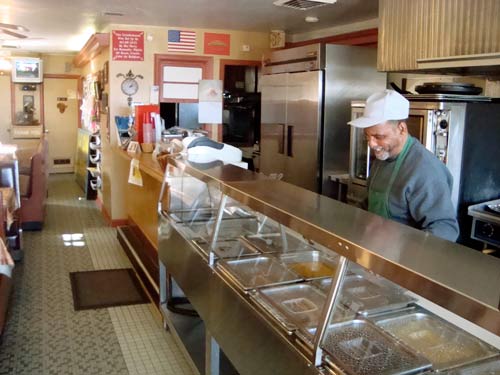By Allie McCoy
UNC Staff Writer
the Durham VOICE
thedurhamvoice@gmail.com
Douglass Coleman was just looking for a good meal, like most patrons, when he walked into Kasib Abdullah’s New Visions of Africa restaurant, 306 Fayetteville Rd., in Durham almost two years ago.
“But I was drafted into the good army,” said Coleman, a former elementary school teacher who now acts as the coordinator of Believers United for Progress’ Hayti Youth for Progress and Enrichment (HYPE) mentoring program for at-risk young men, currently housed at the Holton Career and Resource Center.

Kasib Abdullah, founder and director of Believers United for Progress, outside his New Visions of Africa Restaurant, 306 Fayetteville St. in Durham. (Staff Photo by Allie McCoy)
HYPE is just one of many programs Believers United for Progress now encompasses, all with the objective of bringing respect back into the neighborhood through community engagement, according to Abdullah, founder and director of the organization.
“If you don’t respect the community, then the situations will circle out and become problems elsewhere,” he said. “These are the days that we’re living in now. We have to engage the community first.”
Durham’s Hayti neighborhood was once one of the most prominent and successful black communities in the United States, characterized by “Black Wall Street” and the abundance of black-owned businesses in the early 20th century.
“Being in the Hayti neighborhood, you look around and see what was once powerful and has now fallen on tough times,” said Coleman. “[Abdullah] wanted to help people, so he started feeding people out of his own pocket.”
Believers United for Progress began in 2005 when Abdullah decided to host Iftar, one of the religious observances of Ramadan often done as a community with people gathering to break their fast together, at their local restaurant.
The next year, to accommodate larger numbers, they moved the dinner to the W.D. Hill Center, 1308 Fayetteville St., serving more than 250 people. From there Believers United for Progress continued to grow.
“Everything we do is free and open to the public,” said Abdullah. “It’s not about the numbers or how many we serve, it’s about engaging the community and trying to help the community. We always knew it needed to be a much bigger picture than just feeding people.”
In addition to providing food, these dinners now feature an awards ceremony for those who are doing positive things within the community, as well as informational tables where various outreach groups are able to come and talk about the services they provide.

Kasib Abdullah, founder and director of Believers United for Progress, prepares for the mid-afternoon rush at New Visions of Africa Restaurant in Durham where the organization began. (Staff Photo by Allie McCoy)
The scope of programs through Believers United for Progress span from the youth-focused HYPE program to meal assistance to their newest venture, Operation Clean Sweep, where participants rake leaves for older members of the community.
“We’re trying to incorporate participants into the community through service,” said Coleman.
Abdullah agrees with Coleman: “We go into the community and are able to talk to people and bring them back to the community by making them responsible citizens.”
“We’re always trying to reach out to assets in the community,” said Abdullah. “I always say, we’re all distant family – we just haven’t talked in a long time.”
Right now, the main objective of Believers United for Progress is to develop a Hayti Organizing and Developing Center to encompass the community’s needs within the next year, according to Abdullah.
“Using the vessels and vehicles we have to work with, we have to expand our minds to stay focused on what we said we wanted to do in the first place – to bring dignity and respect back to the community you have to engage the [troubled community members],” he said.
The center hopes to cater to the community’s needs, providing babysitting and job training, as well as jobs at the center to keep it running.
“I don’t know how, but we’re going to do it,” said Abdullah. “I’m a soldier – not a physical, fighting soldier – but whatever I get into, I am going to be successful.”